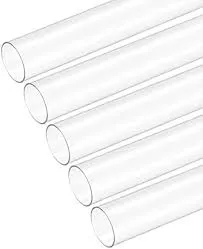Aug . 18, 2024 04:15 Back to list
Exploring the Versatility and Applications of PVC Tubing in Everyday Life
The Versatility of PVC Tubes Applications and Benefits
Polyvinyl chloride (PVC) tubes are an essential component in various industries due to their unique properties and versatility. These tubes are made from a synthetic plastic polymer and are known for their durability, chemical resistance, and affordability. In this article, we will explore the many applications of PVC tubes and the benefits they offer.
One of the most common applications of PVC tubes is in construction. They are frequently used for plumbing and drainage systems. Because PVC is resistant to corrosion and rust, it ensures a longer lifespan compared to metal pipes. This makes it an ideal choice for both residential and commercial buildings. Additionally, PVC tubes are lightweight and easy to install, reducing labor costs and making them more accessible for DIY projects.
The Versatility of PVC Tubes Applications and Benefits
Another notable application of PVC tubes is in the agricultural sector. Farmers use them for irrigation systems and water conveyance. The flexibility and durability of PVC tubes allow for intricate irrigation designs that can adapt to different terrains and crop types. Moreover, since they are resistant to chemicals, they can withstand fertilizers and pesticides, ensuring longevity and effectiveness in agricultural practices.
pvc tube

In the electrical industry, PVC tubes serve a critical role as conduits for wiring. They protect electrical wires from environmental damage and accidental impacts, ensuring safety in both residential and commercial settings. PVC tubing is non-conductive, which adds an extra layer of protection against electrical hazards. Additionally, these tubes can be easily bent and cut to fit specific application requirements, enhancing their versatility.
The entertainment and sports industries also benefit from PVC tubes. Commonly seen in inflatable products, such as pools, rafts, and sports equipment, PVC provides a tough, waterproof barrier that can withstand various conditions. Its lightweight nature makes it ideal for portable equipment, while its durability ensures that these products can last through numerous uses.
The environmental impact of PVC has been a topic of discussion, prompting many manufacturers to implement sustainable practices in PVC production. Innovations in recycling and the use of eco-friendly additives are enhancing the sustainability of PVC products. Thus, while traditional PVC production methods may pose environmental concerns, the industry is evolving to mitigate these impacts.
In summary, PVC tubes are integral to numerous applications ranging from plumbing and medical devices to agriculture and electrical installations. Their durability, resistance to chemicals, and lightweight nature make them a preferred choice across various industries. As environmental concerns rise, the PVC industry is adapting to introduce more sustainable practices, ensuring that these versatile tubes will continue to be beneficial in the years to come. Whether in everyday household applications or critical industrial functions, PVC tubes represent a remarkable blend of utility and innovation.
-
PVC Grey Sheet for Extraction: Chemical Resistant & Durable
NewsAug.19,2025
-
Durable PVC Pipe Fittings for Plumbing & Irrigation Needs
NewsAug.18,2025
-
HDPE Steel Belt Reinforced Spiral Corrugated Pipe | High Strength
NewsAug.17,2025
-
HDPE Pipe Fittings: Durable, Leak-Proof Solutions
NewsAug.16,2025
-
Premium CPVC Sheet: High-Temp & Chemical Resistant Solutions
NewsAug.15,2025
-
Durable PPR Pipe for Hot & Cold Water Systems - Easy Install
NewsAug.14,2025

